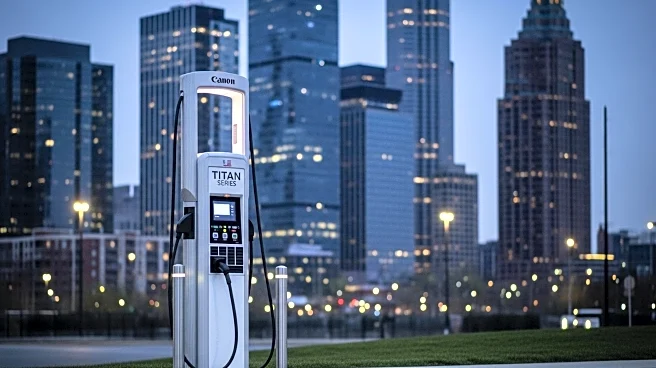What's Happening?
StarCharge has announced that its Titan Series DC fast charging products have achieved compliance with the Build America, Buy America Act (BABA). This compliance marks a significant milestone for the company, enabling it to participate in U.S. federal and state infrastructure projects. The Ohio-based manufacturing facility, established three years ago, plays a crucial role in this achievement, with capabilities in assembly, metal processing, and charging adapter production. The facility currently operates two production lines with plans to expand, creating local jobs and integrating with the community.
Why It's Important?
Achieving BABA compliance is crucial for StarCharge as it positions the company to contribute to the modernization of U.S. energy infrastructure. This compliance supports the broader goal of transitioning to a zero-carbon future by facilitating the deployment of advanced charging solutions. The expansion of the Ohio facility not only creates jobs but also strengthens local economies and supports sustainable development. As the U.S. government prioritizes infrastructure improvements, companies like StarCharge are essential partners in achieving these objectives.
What's Next?
StarCharge plans to expand its production capacity and introduce Battery Energy Storage Systems (BESS) to the U.S. market. The company is also advancing its Aries/Nova 720kW ultra-fast charging platform through the BABA certification process. These developments will enhance StarCharge's product portfolio and support its growth in the U.S. market. Continued collaboration with government and industry partners will be key to furthering infrastructure modernization and achieving environmental goals.
Beyond the Headlines
The compliance with BABA highlights the importance of local manufacturing and sourcing in strengthening national infrastructure. It underscores the role of policy frameworks in driving industry growth and innovation. As companies like StarCharge expand their operations, there may be increased focus on workforce development and training to support new technologies. Additionally, the integration of advanced charging solutions can lead to broader adoption of electric vehicles, contributing to environmental sustainability and reducing reliance on fossil fuels.











